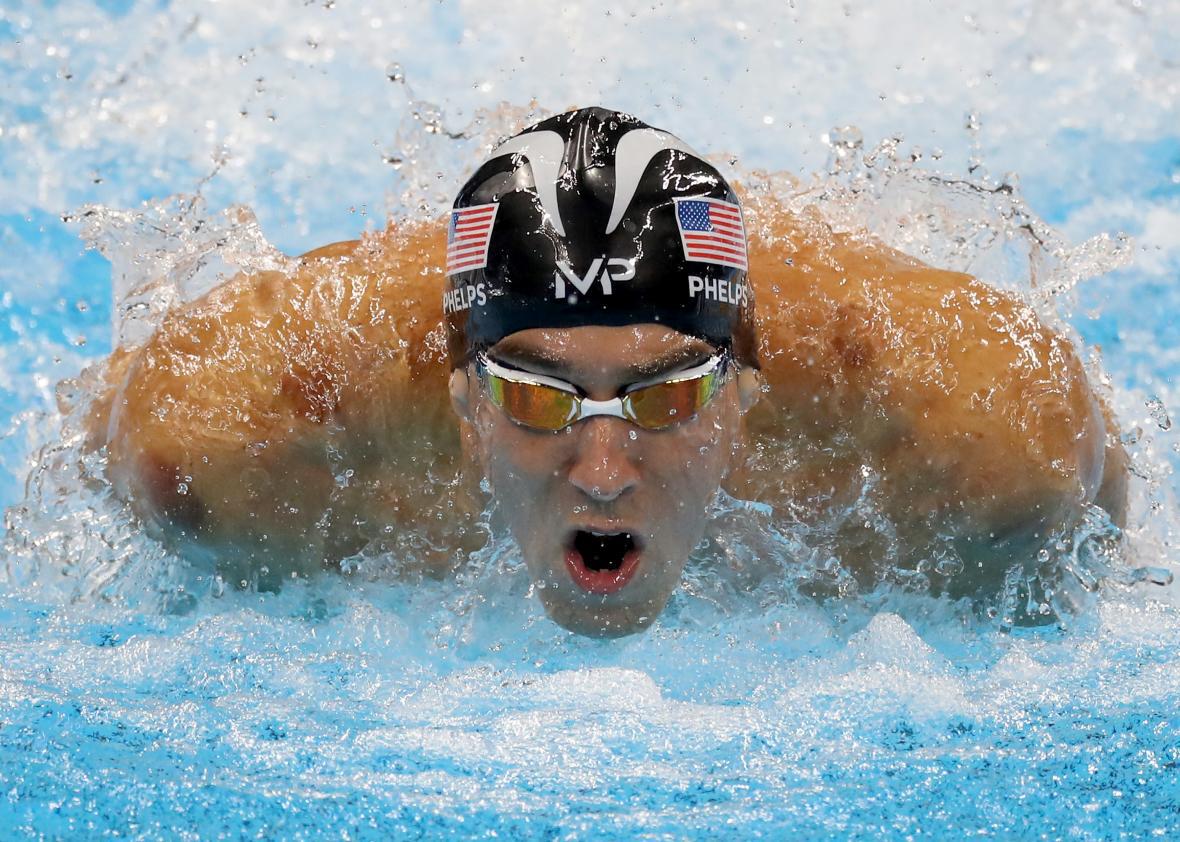What Michael Phelps did on Thursday night will not go down as his most exciting or most memorable accomplishment. He won the men’s 200-meter individual medley with a time (1:54.66) that was the fastest in the world this year but still well off Ryan Lochte’s—jeah, Lochte’s—world record, against a slow field.
But it might be the night he savors the most. It’s the kind of night that seemed nothing more than a faint possibility when Phelps ended his retirement in 2014, only to get a DUI that led to rehab and a suspension that kept him out of the 2015 world championships. Any superstar’s comeback is fraught with tension and uncertainty—would Phelps be Michael Jordan or Tiger Woods? His swim in the 200 IM, along with his gutsy second-place finish in the 100-meter butterfly semifinals shortly thereafter, puts him firmly in the Jordan column. It wasn’t just the fact of the gold medal; it was how he won it, separating himself from the field with what historically had been one of his weakest strokes, the breast. Phelps’ race sent a message: He had evolved.
There were reports that Phelps’ move to Arizona—necessitated by his coach, Bob Bowman, taking the head coaching job at Arizona State—was good for him. He got to live the college life he missed out on the first time around. He trained outside and got a tan. He had fun. And he certainly seemed fitter than ever, to judge by his ASU basketball game striptease.
Rumor had it that he was faster than ever, too. But still. He would be 31 in Rio. A victory in these Olympics would make him the oldest man to win an individual gold in swimming. And what kind of comeback would it be if there were no gold medals? Phelps wisely left the 400-meter individual medley—the most grueling race in swimming, one that he finished an un-Phelps-like fourth in in 2012—out of his program. He entered, then scratched from, the 100-meter and 200-meter freestyle at the Olympic Trials. But that still set him up to swim six races at these games: the 100-meter fly, the 200-meter fly, the 200-meter IM, and three relays. Not a light program for anyone, least of all for a 31-year-old taking his career out of mothballs.
Watching Phelps win the 200-meter butterfly on Wednesday was immensely satisfying for fans who have watched him grow from teenage prodigy to wizened veteran. It’s his signature race. And he lost the gold in 2012 to South Africa’s Chad le Clos.
That race alone made Phelps’ comeback worth it. But following up with a decisive victory in the IM spoke volumes more about him.
The IM is one of swimming’s most interesting races to watch because different swimmers excel in different strokes. Butterfliers take early leads; breaststrokers have to stay as close as they can for the first two legs and hope they can pull ahead. Leads change frequently.
Phelps, of course, goes out strong on butterfly. When he’s going against Lochte, a world-class backstroker, you know it will be a good race if Phelps is leading after the second leg. But what we saw in Wednesday’s semifinal and Thursday’s final was something special. Phelps isn’t a natural breaststroker, but he surged ahead dramatically on that leg. By the time he touched the wall and turned to come home in freestyle, the race was over.
Phelps, finally in a happy place, could have used the Rio Games as a victory lap. He could end on a good note in the 200 butterfly, scoop up some relay hardware, and go home to his young family, a grand old man of American swimming easing into history. But no. His dominating finish in the 200 IM showed it wasn’t just his speed that he recaptured out in the Arizona desert, but his ceaseless ambition.
